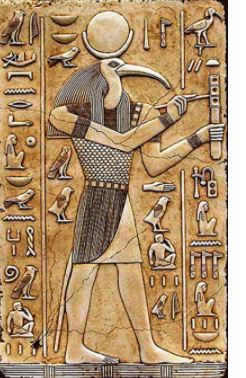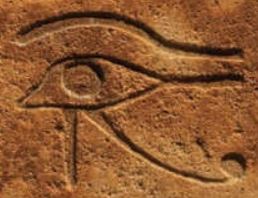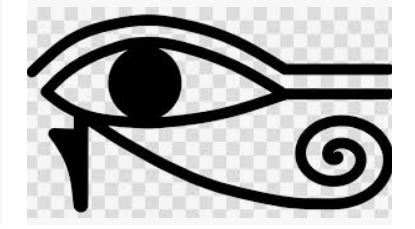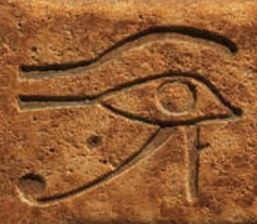As retaled by Plato in the Phaedrus,1 the Egyptians attributed the invention of writing to Thoth:
Writing effected the transformation of sound into sight which may have been considered analogous to the transformations of the moon, Greek σελήνη.2 And it may have been attributed to Thoth for just this reason, since he was first of all the god of the moon. Hence the moon icon that represented Thoth — or that he represented! — and that was regularly depicted above him. Four or five millennia later, selenium, from σελήνη, would be used to effect the reverse process of sight into sound.
The transformations of the moon are not linear. They do not lead away into an undefined distance. Instead they always lead back in a circular process to the same. So with writing. It is different from spoken language in multiple ways and yet it points back to the same. So again with the sounds of the optophone. In all three cases, a linear process expresses in a mirrored way an underlying possibility of identity in difference. Writing, for example, would not work unless it were possible to express the same (oral language) in something that is utterly different (visual figures).
A further icon of Thoth was the wadjet eye:
It is remarkable that the wadjet image links the eye to the labyrinth of the ear. In paintings the lesser circle in the bottom right of this stone engraving was rendered as a spiral.
The implication was not only that the eye leads to the labyrinth of the ear, but also that labyrinth of the ear leads back to the eye — revealing that it, too, is a labyrinth. The greater circle of the stone engraving is the eye’s pupil. Perhaps it appears as a solid only because its labyrinthine rings are so many and so tightly packed together?
Millennia apart, the translations of sound to sight and then of sight to sound were intimately linked with the moon. The curve linking the twin labyrinths of the eye and the ear in the stone engraving might be taken to represent, for both these translations, in Egypt and England, 5000 years apart, the moon’s special power of metamorphosis. And just as much, perhaps, between our metamorphoses between body and mind, subject and object, word and thing, man and woman, old and young — and so on. Eye and ear.
This shared underlying structure, this underlying structure of sharing, this sensus communis, allows, or enforces, conversion between the experience of the different senses such that it is only by abstraction that we speak in terms of the visual, aural or tactile. Perception itself, via any of the senses, is a multifold labyrinth both in the receptive interpretation of its experience and in the combination of the senses contributing to it.
Now if the source of this transformative power of the moon is to be investigated, the answer must be sought in the fact that it is a superlative mirror of the power that is before it (in all the senses of ‘before’). Indeed, the moon has fascinated humans as long as the species has existed on the planet: a riddle that can be guessed at forever. And here is Fournier D’Alba on selenium:
if anyone were to strike a match on the Moon, we could discover the fact on Earth by means of selenium, even without a telescope. And that feat could be accomplished in one second!3
This power of re-flection was portrayed by the Egyptians with Thoth in that his wadjet eye was the mirror image of Ra’s, the sun god’s, wadjet eye:
Just as the moon derives its light from the Sun, and just as Thoth’s eye is the derivative image of the Sun’s eye, so is his power as a magician and scribe a moon-like reflection of that fundamental power of transformation and re-presentation ‘before’ it — that of the Sun, Being itself.
Being itself presents itself, outers itself, utters itself4 — in and to beings. The moon re-represents this originating ex-pression, not by retaining the light it receives only as an im-pression, but by expressing it, reflecting it, in turn. Thoth’s invention of writing turning sound into sight, and Fournier D’Alba’s optophone invention converting writing back into sound, further express in their turn this uttering that is, at once, a going forth and a circling back.
Being does not lose itself in outering itself. Instead its οδός άνω κάτω process as ex-pression gives its im-pression to all beings — while maintaining itself without loss . It is this fundamental dynamic that both enabled and in turn was expressed by the inventions writing and of the optophone. Like the moon, both were a reflection of a power before them that they were able to reflect through the further reflection of written or musical signs to an underlying de-signation.
Now ‘flect’ is already bent as ‘flex’. So ‘re-flect’ is a double bending. This double bending is the signature of Being. It is best re-flected, turn and turn about, re-flected squared, by the moon.
- See McLuhan and Plato 6 – Theuth. ↩
- In both cases, that of the moon and writing, something held changes in their configurations together. Each constantly changed, but remained itself. Further, something enabled them to refer beyond themselves to an original referent, the sun for the moon, spoken speech for writing. ↩
- Moon Element, 56. ↩
- Nietzsche put the kenosis (’emptying out’, hence ‘cenotaph’, the empty tomb of the unknown) of the sun (and by extension of Being) (dual genitives!) in the aptly named ‘Zarathustra’s Prologue‘: “One morning Zarathustra rose with the dawn, stepped before the sun, and spoke to it thus: ‘You great star, what would your happiness be had you not those for whom you shine? For ten years you have climbed to my cave: you would have tired of your light and of the journey had it not been for me and my eagle and my serpent. But we waited for you every morning, took your overflow from you, and blessed you for it. Behold, I am weary of my wisdom, like a bee that has gathered too much honey; I need hands out-stretched to receive it. I would give away and distribute, until the wise among men find joy once again in their folly, and the poor in their riches. For that I must descend to the depths, as you do in the evening when you go behind the sea and still bring light to the underworld, you over-rich star. Like you, I must go under”. In the same place: “Bless the cup that wants to overflow, that the water may flow from it golden and carry everywhere the reflection of its delight.” ↩



